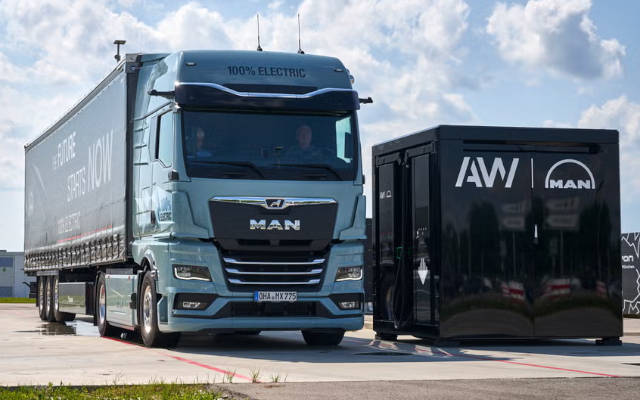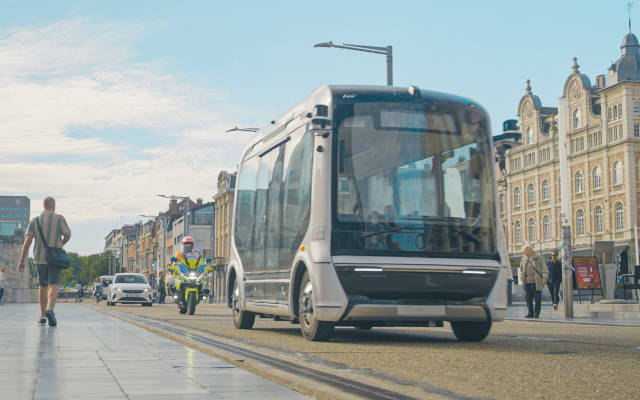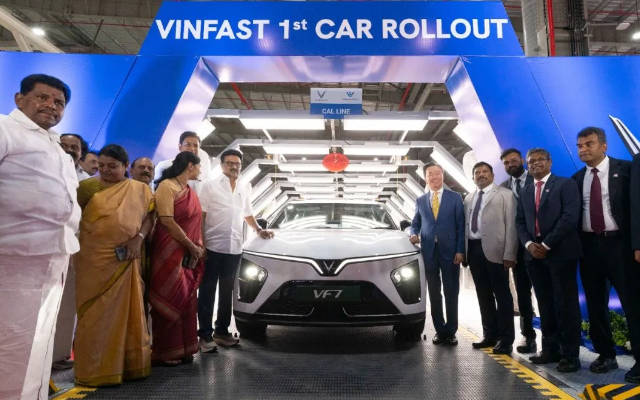 EDITOR'S PICK
EDITOR'S PICK
This Giant Black Box is the EV Charger of the Future
13 Sep 2025 | Synopsis
 A massive black box spotted in California is the Smart Charging Cube, a mobile EV fast charger built by AW Automotive and MAN Truck & Bus. Designed for electric big rigs, it delivers up to 400 kW from its onboard battery and up to 1,000 kW when connected to a Megawatt Charging System. It’s built for job sites and fleet use, offering high-speed charging without permanent grid infrastructure.
A massive black box spotted in California is the Smart Charging Cube, a mobile EV fast charger built by AW Automotive and MAN Truck & Bus. Designed for electric big rigs, it delivers up to 400 kW from its onboard battery and up to 1,000 kW when connected to a Megawatt Charging System. It’s built for job sites and fleet use, offering high-speed charging without permanent grid infrastructure.WeRide Enters Belgium as Autonomous Robobus Rolls Into Leuven
11 Sep 2025 | Synopsis
 WeRide launched its autonomous Robobus in Leuven, Belgium, marking its 11th global market. In partnership with De Lijn and Espaces-Mobilités, the pilot will run through January 2026, aiming to improve first- and last-mile transit. Mapping begins now, with public testing mid-September. The project reflects Belgium’s push for smart mobility and AV integration.
WeRide launched its autonomous Robobus in Leuven, Belgium, marking its 11th global market. In partnership with De Lijn and Espaces-Mobilités, the pilot will run through January 2026, aiming to improve first- and last-mile transit. Mapping begins now, with public testing mid-September. The project reflects Belgium’s push for smart mobility and AV integration.What's Keeping The Indian Middle Class From Driving An Electric Car?
11 Sep 2025 | Synopsis
 India’s middle class is hesitant to adopt EVs due to high import prices, limited public charging, and range anxiety. Tesla’s Model Y costs ₹6M ($68K), far above mainstream affordability. Local production is key—Vietnam’s VinFast and India’s Tata Motors offer EVs closer to ₹1–2.3M. With EVs at just 5.3% market share, scaling infrastructure and lowering costs are critical for broader adoption.
India’s middle class is hesitant to adopt EVs due to high import prices, limited public charging, and range anxiety. Tesla’s Model Y costs ₹6M ($68K), far above mainstream affordability. Local production is key—Vietnam’s VinFast and India’s Tata Motors offer EVs closer to ₹1–2.3M. With EVs at just 5.3% market share, scaling infrastructure and lowering costs are critical for broader adoption.Small Modular Reactors and the Big Questions of Cost & Waste
11 Sep 2025 | Synopsis
 A new study by Kim and Macfarlane finds small modular reactors (SMRs) face steep cost overruns and complex waste challenges. Promised savings rely on mass production that hasn't materialized, while some SMR designs may generate 2–30× more waste per unit of energy. With few commercial deployments and high uncertainty, SMRs remain a high-risk option compared to proven clean technologies.
A new study by Kim and Macfarlane finds small modular reactors (SMRs) face steep cost overruns and complex waste challenges. Promised savings rely on mass production that hasn't materialized, while some SMR designs may generate 2–30× more waste per unit of energy. With few commercial deployments and high uncertainty, SMRs remain a high-risk option compared to proven clean technologies.Why EV World Supports the New Heatwave Attribution Study
11 Sep 2025 | Synopsis
 A peer-reviewed Nature study links 213 heatwaves since 2000 to human-caused climate change, showing emissions from 180 major fossil fuel and cement producers made 53 of them "virtually impossible" without global warming. The study uses EM-DAT data and attribution science to quantify how specific corporate emissions increased deadly heatwave risks, offering a scientific basis for accountability in climate-related harm.
A peer-reviewed Nature study links 213 heatwaves since 2000 to human-caused climate change, showing emissions from 180 major fossil fuel and cement producers made 53 of them "virtually impossible" without global warming. The study uses EM-DAT data and attribution science to quantify how specific corporate emissions increased deadly heatwave risks, offering a scientific basis for accountability in climate-related harm.
 EVWorld Exclusive
EVWorld Exclusive
BrightDrop Fades Out: What's Next for Retail EV Fleets?
21 Oct 2025 |  GM has ended production of its BrightDrop electric vans, leaving retailers like Target and Walmart seeking alternatives. Fewer than 2,000 vans are in service, far below expectations. Ford's E-Transit, Rivian's RCV, and Mercedes' U.S.-built eSprinter are the most viable replacements. BrightDrop's failure highlights the challenges of scaling commercial EVs amid shifting incentives and slow fleet adoption.
GM has ended production of its BrightDrop electric vans, leaving retailers like Target and Walmart seeking alternatives. Fewer than 2,000 vans are in service, far below expectations. Ford's E-Transit, Rivian's RCV, and Mercedes' U.S.-built eSprinter are the most viable replacements. BrightDrop's failure highlights the challenges of scaling commercial EVs amid shifting incentives and slow fleet adoption.
Model Y Competitor? NIO's Onvo L60 Is Affordable EV for the Masses
21 Oct 2025 |  The Onvo L60 is a mid-size electric SUV from NIO’s ONVO brand, designed for families and priced to undercut the Tesla Model Y. It offers up to 462 hp, 525 km range, and supports battery swapping via NIO’s Battery-as-a-Service (BaaS), lowering upfront cost to ~$21,200. Full ownership with battery is ~$29,300. Exports to Europe begin in 2025. With smart tech, spacious design, and flexible pricing, it signals China's EV push into the global mainstream.
The Onvo L60 is a mid-size electric SUV from NIO’s ONVO brand, designed for families and priced to undercut the Tesla Model Y. It offers up to 462 hp, 525 km range, and supports battery swapping via NIO’s Battery-as-a-Service (BaaS), lowering upfront cost to ~$21,200. Full ownership with battery is ~$29,300. Exports to Europe begin in 2025. With smart tech, spacious design, and flexible pricing, it signals China's EV push into the global mainstream.
From Horses to Horsepower: Why EV Skeptics Sound Like 19th-Century Farriers
21 Oct 2025 |  Alan Gelfand's anti-EV stance echoes 19th-century farriers resisting the automobile. His business depends on ICE vehicles, making his critique more nostalgic than neutral. EVs require less maintenance, offer long-term savings, and are backed by expanding service networks. Like carriage makers before him, mechanics must evolve or risk irrelevance. The transition is disruptive - but history favors adaptation over defiance.
Alan Gelfand's anti-EV stance echoes 19th-century farriers resisting the automobile. His business depends on ICE vehicles, making his critique more nostalgic than neutral. EVs require less maintenance, offer long-term savings, and are backed by expanding service networks. Like carriage makers before him, mechanics must evolve or risk irrelevance. The transition is disruptive - but history favors adaptation over defiance.
EV Depreciation: A Temporary Dip, Not a Long-Term Trend
20 Oct 2025 |  EV depreciation concerns are real but overstated. Fleet failures and battery uncertainty skew resale data, yet modern EVs show strong longevity and lower operating costs. Automakers now offer battery health reports, extended warranties, and OTA updates to boost confidence. Policy support and LFP chemistry further stabilize value. As transparency improves, EVs will redefine long-term worth - not just match it.
EV depreciation concerns are real but overstated. Fleet failures and battery uncertainty skew resale data, yet modern EVs show strong longevity and lower operating costs. Automakers now offer battery health reports, extended warranties, and OTA updates to boost confidence. Policy support and LFP chemistry further stabilize value. As transparency improves, EVs will redefine long-term worth - not just match it.
Horse Powertrain: The Hybrid Trojan Horse
17 Oct 2025 |  Horse Powertrain, a joint venture by Renault, Geely, and Aramco, offers compact hybrid engines like the C1 to retrofit EV platforms. Designed as range extenders, these engines run on multiple fuels and meet Euro 7 standards. Though marketed as green tech, their real-world impact is debated - especially as studies show PHEVs are rarely charged. Horse may be a transitional solution, but 500-mile EVs are poised to dominate long-term.
Horse Powertrain, a joint venture by Renault, Geely, and Aramco, offers compact hybrid engines like the C1 to retrofit EV platforms. Designed as range extenders, these engines run on multiple fuels and meet Euro 7 standards. Though marketed as green tech, their real-world impact is debated - especially as studies show PHEVs are rarely charged. Horse may be a transitional solution, but 500-mile EVs are poised to dominate long-term.
 22 Oct 2025 05:08:10 UTC |
RECENT PODCASTS
Texas Tesla Charging Bill - Archer Buys Lillium Assets - DHL Fleet
SEARCH RSSTREAM
 49 New Postings In Past 24 Hours
49 New Postings In Past 24 Hours
Category:finance
Region:NoAmerica
Date:21 Oct 2025
Category:environment
Region:NoAmerica
Date:21 Oct 2025
Category:review
Region:NoAmerica
Date:21 Oct 2025
Category:energy
Region:Europe
Date:21 Oct 2025
Category:mobility
Region:NoAmerica
Date:21 Oct 2025
Category:finance
Region:NoAmerica
Date:21 Oct 2025
Category:mobility
Region:NoAmerica
Date:21 Oct 2025
Category:energy
Region:NoAmerica
Date:21 Oct 2025
Category:policy
Region:NoAmerica
Date:21 Oct 2025
Category:policy
Region:Global
Date:21 Oct 2025
Category:finance
Region:NoAmerica
Date:21 Oct 2025
Category:mobility
Region:NoAmerica
Date:21 Oct 2025
Category:energy
Region:NoAmerica
Date:21 Oct 2025
Category:energy
Region:Global
Date:21 Oct 2025
Category:energy
Region:NoAmerica
Date:21 Oct 2025
Category:mobility
Region:AsiaPacific
Date:21 Oct 2025
Category:mobility
Region:Europe
Date:21 Oct 2025
Category:energy
Region:NoAmerica
Date:21 Oct 2025
Category:finance
Region:NoAmerica
Date:21 Oct 2025
Category:energy
Region:NoAmerica
Date:21 Oct 2025